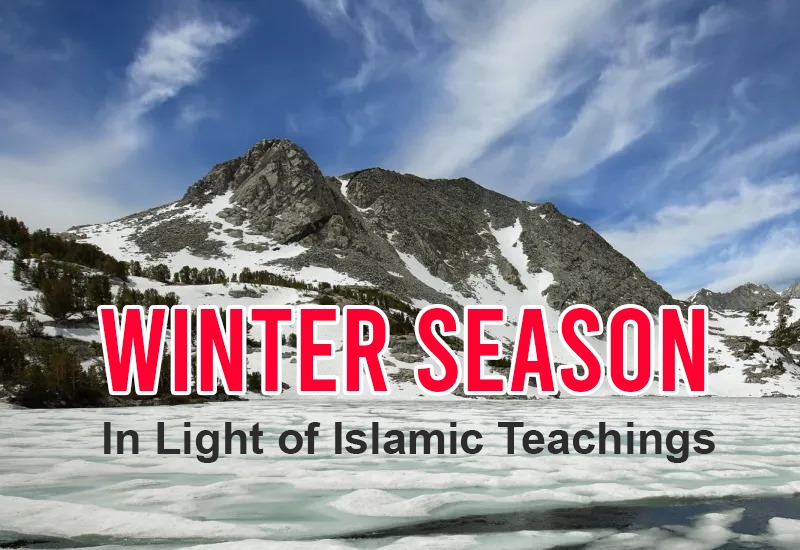As the winter season sets in for many countries, we are reminded of many things. One of them is that just as Allah (عَزَّوَجَلَّ) has made differences in human nature, temperament, color, race, appearance, family and tribe, similarly, there is a change in the seasons of the year. The changing of the color of the leaves or their falling are all signs of change.
Change is the secret of this universe. The change of seasons teaches us that everything in the universe has to change, what has come must go. What is rising today will fall tomorrow. Allah (عَزَّوَجَلَّ) has also said in the Holy Qur’an that:
إِنَّ فِي خَلْقِ السَّمَاوَاتِ وَالْأَرْضِ وَاخْتِلَافِ اللَّيْلِ وَالنَّهَارِ لَآيَاتٍ لِّأُولِي الْأَلْبَابِ
Indeed, in the creation of the heavens and the earth and the alternation of the night and the day are signs for those of understanding.
[Aal-i-Imran: 190]
Cause of Cold
From the study of the hadith of the Prophet ﷺ, it is known that the cause of cold is that it is caused by the breath of hell. Abu Huraira (رَضِيَ ٱللَّٰهُ عَنْهُ) reported that the Messenger of Allah (ﷺ) said:
The Fire said to the Lord: O Lord! Some parts of mine have consumed the others, so allow me to exhale (in order to find some relief from this congestion). It was granted permission to take two exhalations, one exhalation during the winter and the other exhalation during the summer, so whatever you perceive in the form of intense cold or hurting cold is from the exhalation of Hell. And whatever you perceive in the form of extreme heat or intense beat is from the exhalation of Hell.
(Sahih Muslim 617)
Keeping in mind the change of weather, we adopt different means and resources to avoid cold in winter and heat in summer. Similarly, to protect ourselves from the extreme cold and heat in the Hereafter, let us take measures to avoid Hell.
Winter and the Teachings of the Prophet ﷺ
Don’t Blame the Season
Since winter and summer are the creations of Allah (عَزَّوَجَلَّ), the cold and heat exist by the command of Allah (عَزَّوَجَلَّ). Therefore, it is not permissible to abuse or badmouth them. Allah’s Messenger (ﷺ) said,
قَالَ اللَّهُ عَزَّ وَجَلَّ يُؤْذِينِي ابْنُ آدَمَ، يَسُبُّ الدَّهْرَ وَأَنَا الدَّهْرُ، بِيَدِي الأَمْرُ، أُقَلِّبُ اللَّيْلَ وَالنَّهَارَ
Allah said, “The son of Adam hurts me for he abuses Time though I am Time: in My Hands are all things, and I cause the revolution of day and night.”
(Sahih al-Bukhari 4826, Sahih Muslim 2246)
In the mentioned hadith, “دھر” refers to both age and time, because age and time are almost the same. Time refers to a moment, while age is used for some period of time as if time is part of age.
From the interpretation of this hadith, it is known that it is the work of polytheists of Arabs, and atheists, to speak evil of the time and to blame it by attributing their difficulties and sorrows to the time. Cursing time is cursing Allah (عَزَّوَجَلَّ).
Don’t Curse the Wind
Just as cold and heat are the creation of Allah (عَزَّوَجَلَّ), in the same way, the wind is also His creation. Hence, it is not permissible to abuse, curse or speak ill of it. It is mentioned in a hadith:
“The wind snatched away a man’s cloak during the time of the Prophet (ﷺ) and he cursed it. The Prophet (ﷺ) said: Do not curse it, for it is under command, and if anyone curses a thing undeservedly, the curse returns upon him.”
(Sunan Abi Dawud 4908)
Prayer for Goodness, Seeking Refuge from the Evil
Regarding strong winds and storms, the Messenger of Allah (ﷺ), said:
الرِّيحُ مِنْ رَوْحِ اللَّهِ
“The wind comes from Allah’s mercy;”
“It is Allah’s mercy; it (sometimes) brings blessing and (sometimes) brings punishment. So when you see it, do not revile it, but ask Allah for some of its good, and seek refuge in Allah from its evil.”
(Sunan Abi Dawud 5097)
Du’a in Times of Strong Winds
In winter, when strong winds blow, we quickly close the doors and windows of the house, but on such occasions, we forget the teachings of the Prophet (ﷺ). Aisha, the wife of the Messenger of Allah (ﷺ), said that whenever the wind was stormy, the Messenger of Allah (ﷺ) used to say:
اللهُمَّ إِنِّي أَسْأَلُكَ خَيْرَهَا، وَخَيْرَ مَا فِيهَا، وَخَيْرَ مَا أُرْسِلَتْ بِهِ، وَأَعُوذُ بِكَ مِنْ شَرِّهَا، وَشَرِّ مَا فِيهَا، وَشَرِّ مَا أُرْسِلَتْ بِهِ
“O, Allah! I ask Thee for what is good in it, and the good which it contains, and the good of that which it was sent for. I seek refuge with Thee from what is evil in it, what evil it contains, and the evil of that what it was sent for.”
(Sahih Muslim 899)
Don’t Curse Fever
Due to the severity of the cold in winter, people often suffer from various diseases such as cold, flu and fever. As a result, many start cursing these diseases and start saying bad things about them and forget what reward Allah (عَزَّوَجَلَّ) has placed in these sufferings. Any suffering or illness should not be cursed or abused because it comes in the hadith, that Jabir b. Abdullah reported that Allah’s Messenger (ﷺ) visited Umm Sa’ib or Umm Musayyib and said:
Umm Sa’ib or Umm Musayyib! Why is it that you are shivering? She said: “It is fever and may it not be blessed by Allah, whereupon he (the Holy Prophet) said: Don’t curse fever for it expiates the sin of the children of Adam just as a furnace removes the alloy of iron.
(Sahih Muslim 2575)
Winter Season and Righteous Deeds
Allah (عَزَّوَجَلَّ) has blessed us with resources and means for raising our ranks and His blessing is the forgiving of our sins. Among these resources, one of the most important means is righteous deeds, that is, these righteous deeds erase our sins and make us worthy of a great reward in this world and the Hereafter. Therefore Allah (عَزَّوَجَلَّ) says:
وَأَقِمِ الصَّلَاةَ طَرَفَيِ النَّهَارِ وَزُلَفًا مِّنَ اللَّيْلِ ۚ إِنَّ الْحَسَنَاتِ يُذْهِبْنَ السَّيِّئَاتِ ۚ ذَٰلِكَ ذِكْرَىٰ لِلذَّاكِرِينَ
And establish prayer at the two ends of the day and the approach of the night. Indeed, good deeds do away with misdeeds. That is a reminder for those who remember.
[Hud: 114]
Supererogatory Fasts
In the winter season, the days are short and the nights are long. With the shorter days, It is very easy to fast. These short days are a great opportunity for a Muslim to earn good deeds and rewards. By enduring a little effort in these days, one can very easily accumulate great rewards for one’s hereafter. Amir bin Mas’ud narrated that the Prophet (ﷺ) said:
“Fasting during the winter is an easy reward.”
(Jami` at-Tirmidhi 797)
That is, it is a reward that is freely obtained without any effort because of the duration of the days and nights. Umar bin Khattab (رَضِيَ ٱللَّٰهُ عَنْهُ) says:
“Winter is booty for devout worshipers.”
(Ibn Abi Shaybah 34468)
The famous Tabi Ubaid bin Umair Kaithi (may Allah have mercy upon him), when the winter season came, he would say:
“O People of the Qur’an, the nights have become long for your prayers and the days have become short for your fasting, so take advantage of it.”
(Ibn Abi Shaybah 9826)
Allah (عَزَّوَجَلَّ) loves fasting, therefore, its reward is also very high. The Prophet (ﷺ) said:
“Indeed, anyone who fasts for one day for Allah’s Pleasure, Allah will keep his face away from the (Hell) fire for (a distance covered by a journey of) seventy years.”
(Sahih al-Bukhari 2840, Sahih Muslim 1153)
Fasting is the way to paradise. Abu Umamah (رَضِيَ ٱللَّٰهُ عَنْهُ) narrates that he asked the Messenger of Allah (ﷺ):
O Messenger of Allah! Order me something with which Allah (عَزَّوَجَلَّ) will give me great benefit. He said: “Make fasting a routine because there is nothing like it.”
(Musnad Ahmad 22249)
Apart from the obligatory fasts of Ramadhan, it is proven by the Prophet ﷺ to observe supererogatory fasts at different times of the year. Among the supererogatory fasts are, fasting on Ayaam al-Beed (fasting for three days in the middle of each Hijri month), fasting on Monday and Thursday, fasting in the month of Muharram, fasting on the day of ‘Aashura along with the day before or day after, fasting on ten days of Dhul-Hijjah, fasting on the day of ‘Arafah, fasting in the month of Sha’baan, and six fasts of Shawwal.
The Virtue of Ablution in the Cold
The Messenger of Allah (ﷺ) said:
Should I not suggest to you that by which Allah obliterates the sins and elevates the ranks (of a man)? They (the hearers) said: Yes, Messenger of Allah. He said: Performing the ablution thoroughly despite odds, taking many steps towards the mosque, and waiting for the next prayer after observing a prayer, and that is mindfulness.
(Sahih Muslim 251)
Wash the Body Parts Thoroughly in Ablution
In the winter season, when the intensity of the cold increases, some people do not wash their body parts properly while being lazy in ablution. It has been emphasized to properly adhere to the thorough washing during wudhu. Abdullah b. Amr reported:
The Messenger of Allah (ﷺ) lagged behind us on a journey. We travelled (back) and be took him; and then came the time of the afternoon prayer, and as we were going to wipe our feet he (the Holy Prophet) called out: Woe to the heels because of Hell-fire.
(Sahih Muslim 241)
Offering Prayers in the Masjid
Due to the severity of the cold, most people are not willing to go to the masjid to perform congregational prayers, especially the Isha and Fajr prayers. As a result, people are deprived of the virtues of going to the masjid and the congregational prayers of Isha and Fajr prayers. They are further deprived of the great blessings of going to the mosque in the dark and its great rewards.
Some Virtues of Going to Masjid
The Holy Prophet (ﷺ) while describing the virtues of going to the masjid to pray in the dark, said:
“Give good tidings to those who walk to the mosques in darkness for having a perfect light on the Day of Judgment.”
(Sunan Abi Dawud 561)
Abu Huraira (رَضِيَ ٱللَّٰهُ عَنْهُ) reported:
The Messenger of Allah (ﷺ) said: He who purified himself in his house, and then he walked to one of the houses of Allah for the sake of performing a Fard (obligatory act) out of the Fara’id (obligatory acts) of Allah, both his steps (would be significant) as one of them would obliterate his sin and the second one would raise his status.
(Sahih Muslim 666)
Pray for Well-being
In the cold winds and chilly nights of winter, there is suffering. There may be a cold, cough and fever, etc., due to which many types of problems are faced. In such a situation, a person should be satisfied with the decision of Allah (عَزَّوَجَلَّ) with all his heart and soul, act patiently and keep praying to Him for healing, because this is the cure for his sorrows and this is the cure for his worries and troubles. Abu Hurairah (رَضِيَ ٱللَّٰهُ عَنْهُ) narrated that, the Messenger of Allah (ﷺ) said
“Indeed, he who does not ask Allah, He gets angry with him.”
(Jami` at-Tirmidhi 3373)
Al-`Abbas bin `Abdul-Muttalib said:
“I said: ‘O Messenger of Allah, teach me something that I may ask Allah, [Mighty and Sublime] for.’ He (ﷺ) said: ‘Ask Allah for Al-`Āfiyah.’ Then I remained for a day, then I came and said: ‘O Messenger of Allah, teach me something that I may ask Allah for.’ So he (ﷺ) said to me: “O Abbas, O uncle of the Messenger of Allah! Ask Allah for Al-`Āfiyah in the world and in thereafter.”
(Jami` at-Tirmidhi 3514)
Charity
In the hadiths, there is a great virtue of charity, its reward is up to 700 times, and then if the charity is given at a time of people’s need, its virtue increases even more. Especially in the winter season when people need warm clothes and quilts to avoid cold and need food due to low income, so the virtue of charity increases on such days. If we take a look at how many people there are in our locality, in the neighborhood and in our surrounding area, who have no clothes, blankets nor quilts to protect themselves from the cold. For the wealthy and those who want to do goods, helping such poor people is a great opportunity to earn rewards while its virtues are abundant. Allah’s Messenger (ﷺ) said:
“The one who looks after and works for a widow and a poor person is like a warrior fighting for Allah’s Cause.”
(Sahih al-Bukhari 6007)
Repentance and Seeking Forgiveness
At this time, there is a climate change all over the world, and many towns and villages are wiped out due to stormy rains. Due to the daily earthquakes and storms, the loss of life and property has started on a large and wide scale. To alleviate, it is necessary that we repent for our sins, seek forgiveness, pray to Allah (عَزَّوَجَلَّ) and make special prayers. Allah’s Messenger (ﷺ) said:
“O people, seek repentance from Allah. Verily, I seek repentance from Him a hundred times a day.”
(Sahih Muslim 2702)
On the long winter nights, there is peace, contentment, and silence in the air everywhere, all people are fast asleep. In this peaceful environment, a person, as a weak and helpless person, raises his hands to seek the mercy, grace, and favor of his Lord. So, at this time, Allah Almighty opens the doors of repentance and mercy and comes closer to His servants. It is a moment of reflection for people drowning in the seas of sins, how much we need repentance and forgiveness.
From the study of the Qur’an and Hadith, it is clear that winter is the season of worship. So, spend it on good deeds as much as possible. Keep fasts, during these days the qadha (missed) fasts of Ramadan can also be kept easily. Give charity. The nights are very long, spend them in acts of worship such as Tahajjud, supplication and forgiveness, recitation of the Holy Qur’an, dhikr, and Durood, etc. Do not waste this time and do not let this season out of your hands for you do not know whether you will be around to witness the beautiful cold season and the benefits it brings with it in the form of an opportunity to draw closer to your Rabb.











